
Little Games is the fourth American album by English rock band the Yardbirds. Recorded and released in 1967, it was their first album recorded after becoming a quartet with Jimmy Page as the sole guitarist and Chris Dreja switching to bass. It was also the only Yardbirds album produced by Mickie Most.
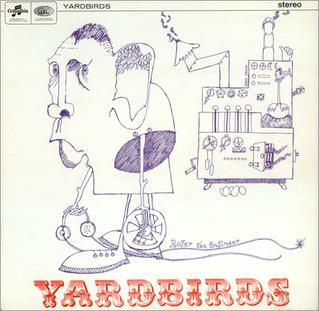
Roger the Engineer is the only UK studio album and the third US album by English rock band the Yardbirds. Recorded and released in 1966, it contains all original material and is the only Yardbirds album with guitarist Jeff Beck on all tracks. It was produced by bassist Paul Samwell-Smith and manager Simon Napier-Bell.

Five Live Yardbirds is the live debut album by English rock band the Yardbirds. It features the group's interpretations of ten American blues and rhythm and blues songs, including their most popular live number, Howlin' Wolf's "Smokestack Lightning". The album contains some of the earliest recordings with guitarist Eric Clapton.

For Your Love is the first American album by English rock band the Yardbirds. Released in July 1965, it contains new studio recordings along with previously released singles. The album features some of the earliest recordings by guitarists Eric Clapton and his replacement Jeff Beck.

Having a Rave Up with the Yardbirds, or simply Having a Rave Up, is the second American album by English rock group the Yardbirds. It was released in November 1965, eight months after Jeff Beck replaced Eric Clapton on guitar. It includes songs with both guitarists and reflects the group's blues rock roots and their early experimentations with psychedelic and hard rock. The title refers to the driving "rave up" arrangement the band used in several of their songs.
"White Summer" is a guitar instrumental by English rock guitarist Jimmy Page, that incorporates Indian and Arabic musical influences. Page initially recorded and performed it with the Yardbirds and later included it in many Led Zeppelin concerts.

"Happenings Ten Years Time Ago" is a song by the English group the Yardbirds. Written and recorded in 1966, it is considered one of their most progressive works. The song was the group's first to feature the dual-lead guitar line-up of Jeff Beck and Jimmy Page. The two contribute an array of guitar parts during the instrumental sections, described as "a full-on six-string apocalypse". Lyrically, it deals with notions of past life and déjà vu.

"Over Under Sideways Down" is a 1966 song by English rock group the Yardbirds. A composition credited to all members of the group, it combines elements of blues rock and psychedelic rock. It was first released as a single in May 1966 as a follow-up to "Shapes of Things" and in July was included on group's self-titled UK album.

"Shapes of Things" is a song by the English rock group the Yardbirds. With its Eastern-sounding, feedback-laden guitar solo and anti-war/pro-environmental lyrics, several music writers have identified it as the first popular psychedelic rock song. It is built on musical elements contributed by several group members in three different recording studios in the US and was the first Yardbirds' composition to become a record chart hit. When it was released as a single on 25 February 1966, the song reached number three in the UK and number eleven in the US.

"I Wish You Would" is a song recorded by Chicago blues musician Billy Boy Arnold in 1955. It was developed while Arnold was performing with Bo Diddley and incorporates a Diddley-style rhythm. Called "a timeless Chicago blues classic", "I Wish You Would" is Arnold's best-known song and has been recorded by several artists, including the Yardbirds, who recorded it for their debut single in 1964.
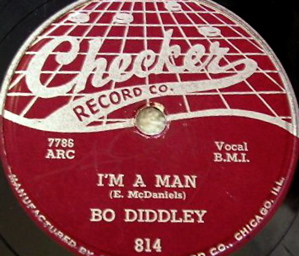
"I'm a Man" is a rhythm and blues song written and recorded by Bo Diddley in 1955. Inspired by an earlier blues song, it was one of his first hits. "I'm a Man" has been recorded by a variety of artists, including the Yardbirds, who adapted it in an upbeat rock style.

"Train Kept A-Rollin'" is a song first recorded by American jazz and rhythm and blues musician Tiny Bradshaw in 1951. Originally performed in the style of a jump blues, Bradshaw borrowed lyrics from an earlier song and set them to an upbeat shuffle arrangement that inspired other musicians to perform and record it. Johnny Burnette and the Rock and Roll Trio made an important contribution in 1956 – they reworked it as a guitar riff-driven song, which features an early use of intentionally distorted guitar in rock music.
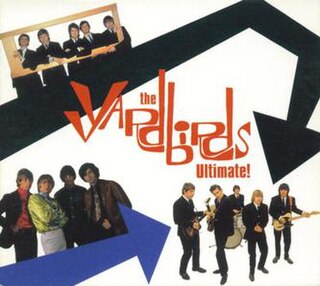
Ultimate! is a comprehensive career retrospective album by English rock group the Yardbirds. The 52-song two–compact disc compilation was released in 2001 by Rhino Records. The tracks span the period from the group's first demo recordings in 1963 to the last singles in 1968. They include all 17 of the group's singles, both A-side and B-sides, supplemented with more than a dozen album tracks, their performance for the film Blow-Up, and three early solo numbers by singer Keith Relf.

"Heart Full of Soul" is a song recorded by English rock group the Yardbirds in 1965. Written by Graham Gouldman, it was the Yardbirds' first single after Jeff Beck replaced Eric Clapton as lead guitarist. Released only three months after "For Your Love", "Heart Full of Soul" reached the Top 10 on the singles charts in the UK, US, and several other countries.

"Evil Hearted You" is a 1965 song by English rock group the Yardbirds. It was written by future 10cc member Graham Gouldman, who also wrote the group's two prior singles, "For Your Love" and "Heart Full of Soul". It reached No. 3 on the main UK singles chart.

The Yardbirds were an English rock group that had a string of Top 40 radio hits in mid-1960s in the UK and the US and introduced guitarists Eric Clapton, Jeff Beck, and Jimmy Page. Their first album released in the UK, Five Live Yardbirds (1964), represented their early club performances with Clapton. The Yardbirds' first American album, For Your Love (1965), was released to capitalise on their first hit, and to promote the group's first US tour. However, Clapton had already decided to pursue a different musical direction and was replaced by Beck. Several popular singles with Beck followed, including a second American album, Having a Rave Up with the Yardbirds (1965), that, as with their previous album, was a split release featuring songs with both Clapton and Beck.
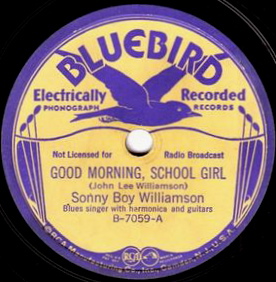
"Good Morning, School Girl" is a blues standard that has been identified as an influential part of the blues canon. Pre-war Chicago blues vocalist and harmonica pioneer John Lee "Sonny Boy" Williamson first recorded it in 1937. Subsequently, a variety of artists have recorded versions of the song, usually calling it "Good Morning Little Schoolgirl".

The Yardbirds are an English rock band, formed in London in 1963. The band's core lineup featured vocalist and harmonica player Keith Relf, drummer Jim McCarty, rhythm guitarist and later bassist Chris Dreja, and bassist/producer Paul Samwell-Smith. The band started the careers of three of rock's most famous guitarists: Eric Clapton, Jeff Beck and Jimmy Page, all of whom ranked in the top five of Rolling Stone magazine's list of 100 greatest guitarists. The band had a string of hits throughout the mid-1960s, including "For Your Love", "Heart Full of Soul", "Shapes of Things", and "Over Under Sideways Down".

"Ha! Ha! Said the Clown" is a song written by Tony Hazzard, first recorded by British pop group Manfred Mann. Hazzard claims the song "came out of the blue" though he did not demo it for weeks. Following recording a demo, he approached manager Gerry Bron, who liked it enough to want one of his groups, Manfred Mann, to record it. Manfred Mann recorded their version of the single on 10 February 1967 at Philips Studio in Marble Arch, London, together with producer Shel Talmy. It was the second of three singles Manfred Mann recorded to feature the Mellotron.
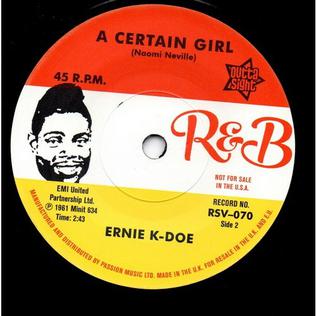
"A Certain Girl" is a rhythm and blues song written by Allen Toussaint, with the credit listed under his pen name Naomi Neville. New Orleans R&B singer Ernie K-Doe recorded it in 1961. Minit Records released the song as the B-side of "I Cried My Last Tear".



















